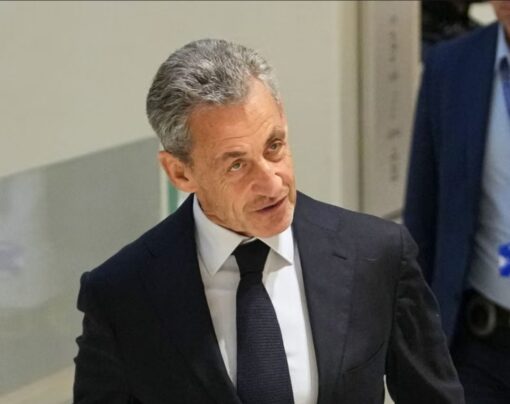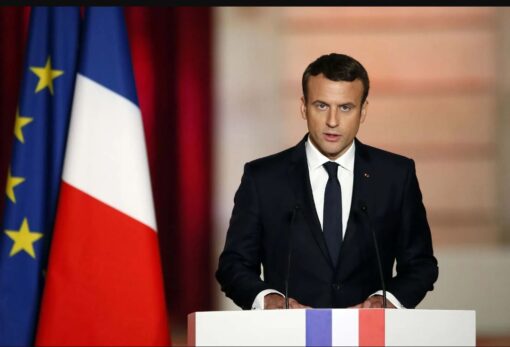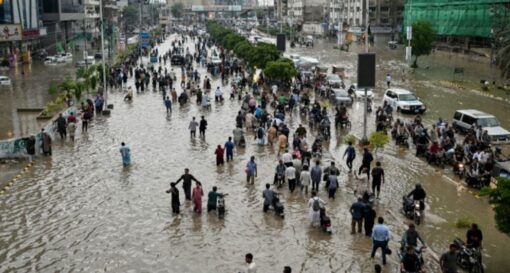Former French president Nicolas Sarkozy has been found guilty of criminal conspiracy in a landmark corruption case that has gripped France for more than a decade.
The ruling, delivered in a packed Paris courtroom, marks the most dramatic chapter yet in a saga that links the former head of state to the late Libyan leader Muammar Gaddafi, millions in illicit campaign cash, and accusations of secret deals struck at the highest levels of power.
The 70-year-old conservative leader, who served as president from 2007 to 2012, has faced years of allegations that he accepted millions of euros in illegal financing from Gaddafi’s regime to support his successful 2007 presidential campaign.
Judges concluded that Sarkozy entered into a criminal agreement to obtain foreign funds in exchange for political favors, a verdict that could end any lingering hopes of a political comeback for the man once dubbed “Sarko the American.”

The case against Sarkozy was unlike any corruption trial France had ever seen. Investigators spent more than a decade piecing together evidence that spanned continents, bank transfers, cash deliveries, and high-level meetings between French officials and Libyan operatives.
At the heart of the allegations was a 2005 meeting, when Sarkozy was serving as interior minister. Prosecutors argued that he struck a secret deal with Gaddafi’s regime: in exchange for France’s diplomatic support and a softening of Libya’s international isolation, Sarkozy would receive millions to bankroll his campaign.
For years, Sarkozy denied every accusation, dismissing the case as a politically motivated witch-hunt orchestrated by enemies determined to destroy his reputation.
His defense team argued that the entire affair was built on unreliable testimony, conflicting documents, and the word of former Libyan officials who had their own motives for turning against the French leader.
But the court ruled otherwise, finding that Sarkozy had indeed conspired to solicit and conceal foreign campaign financing — a direct violation of French law and international norms designed to protect democratic integrity.
The shadow of Muammar Gaddafi loomed large over the proceedings. Once a pariah on the world stage, the Libyan strongman sought legitimacy and influence by cultivating ties with Western leaders.
The trial revealed how French intermediaries allegedly funneled Libyan money into Sarkozy’s 2007 campaign, using complex channels to disguise the origins of the funds. Witnesses described the clandestine delivery of suitcases stuffed with cash.
Others recounted high-level meetings in Tripoli, where French officials assured Libyan counterparts of a “mutually beneficial partnership” if Sarkozy won the presidency.
Investigators uncovered bank records and testimonies suggesting that tens of millions were promised, although the precise sums that actually reached Sarkozy’s campaign remain contested. The court determined that, regardless of the exact amount, the conspiracy to accept illicit foreign funding was undeniable.
Sarkozy was convicted on the most serious charge of criminal conspiracy but acquitted of others, including passive corruption and direct illegal campaign financing.
The mixed verdict reflects the court’s recognition of a broader agreement with Gaddafi while acknowledging the difficulties of proving each individual transaction. The judges are expected to announce the sentencing in the coming days.
Sarkozy is almost certain to appeal, which would suspend any immediate prison term. His defense team declared that they would challenge the decision “with determination and confidence,” insisting that the former president would ultimately be vindicated.
This is not Sarkozy’s first encounter with the law. He has already been convicted in two other corruption cases — one involving attempts to bribe a judge in exchange for confidential information, and another related to illegally overspending during his failed 2012 re-election campaign.
Both verdicts are under appeal. But the new ruling is by far the most politically explosive, linking him to one of the most notorious dictators of modern times.
The conviction has sent shockwaves through French politics. Sarkozy, once a dominant figure on the right, had been quietly nurturing hopes of a political revival, positioning himself as an elder statesman capable of uniting conservatives in a time of fragmentation.
Those ambitions now lie in tatters. “This is unprecedented — never before has a former French head of state been convicted of conspiring with a foreign regime to finance his election,” one constitutional scholar noted. “It is a moment of reckoning for French democracy.”
Critics say the case exposes not only the vulnerabilities of France’s campaign financing system but also the broader risks of cozying up to authoritarian leaders for short-term political gain.
The scandal also carries deep international implications. If Sarkozy indeed accepted funds from Gaddafi, it would mean that a French president’s legitimacy was tainted by foreign interference at a time when Libya was still considered an adversary by much of the Western world.
It also raises uncomfortable questions about Sarkozy’s later role in the 2011 NATO-led intervention in Libya, which helped topple Gaddafi. Some critics argue that his eagerness to remove the Libyan leader may have been motivated, at least in part, by a desire to eliminate a man who possessed potentially incriminating information.
“France went to war in Libya under Sarkozy,” one Middle East analyst observed. “If the same man was secretly indebted to Gaddafi, the whole episode takes on a much darker dimension.”
Outside the courthouse, Sarkozy remained defiant. “I have never betrayed my country, I have never taken a single cent from Libya,” he told reporters. “This judgment is an injustice, and I will fight it with all my strength.”
His allies echoed the sentiment, portraying the case as a vendetta against a leader who dared to challenge the political establishment. Supporters outside the court waved placards declaring “Justice for Sarko,” while opponents hailed the ruling as proof that no one, not even a former president, is above the law.

The Sarkozy affair comes at a time when European governments are under mounting pressure to crack down on political corruption. Across the continent, scandals involving illicit financing, influence peddling, and shadowy links to foreign powers have eroded public trust in institutions.
French officials hope the conviction will serve as a deterrent. “This case shows that our democracy is capable of defending itself,” one justice ministry spokesperson said. “The rule of law applies to all, regardless of status or power.”
Yet skeptics warn that the drawn-out nature of the investigation, which spanned more than a decade, highlights the difficulties of holding powerful figures accountable. “Justice has been done, but justice delayed is justice denied,” one opposition MP commented.
With sentencing pending, all eyes will be on Sarkozy’s appeal. If upheld, the conviction could mean a significant prison sentence, although French law allows for part of it to be served under house arrest or with electronic monitoring.
Politically, the verdict has already reshaped the landscape. Sarkozy’s party, long divided between loyalists and reformers, faces an identity crisis as it grapples with the disgrace of its most prominent figure. Meanwhile, rivals on the left are seizing on the ruling as proof of the need for stronger transparency laws and stricter campaign finance regulations.
Internationally, the scandal has tarnished France’s reputation as a champion of democratic values, raising questions about how deeply corruption has penetrated its political elite.
The conviction of Nicolas Sarkozy on charges of criminal conspiracy marks an extraordinary moment in modern French history. A former president, once at the height of global influence, has been found guilty of secretly colluding with a dictator to undermine the very foundations of democratic politics.
Whether or not Sarkozy succeeds in overturning the verdict on appeal, the damage to his legacy is irreversible. For France, the case serves as both a cautionary tale and a test of democratic resilience.
For the wider world, it is a reminder that the corrupting reach of authoritarian money can extend even into the heart of Western democracies. As the sentencing looms, one truth is clear: the Sarkozy affair will cast a long shadow over France’s political life for years to come.


